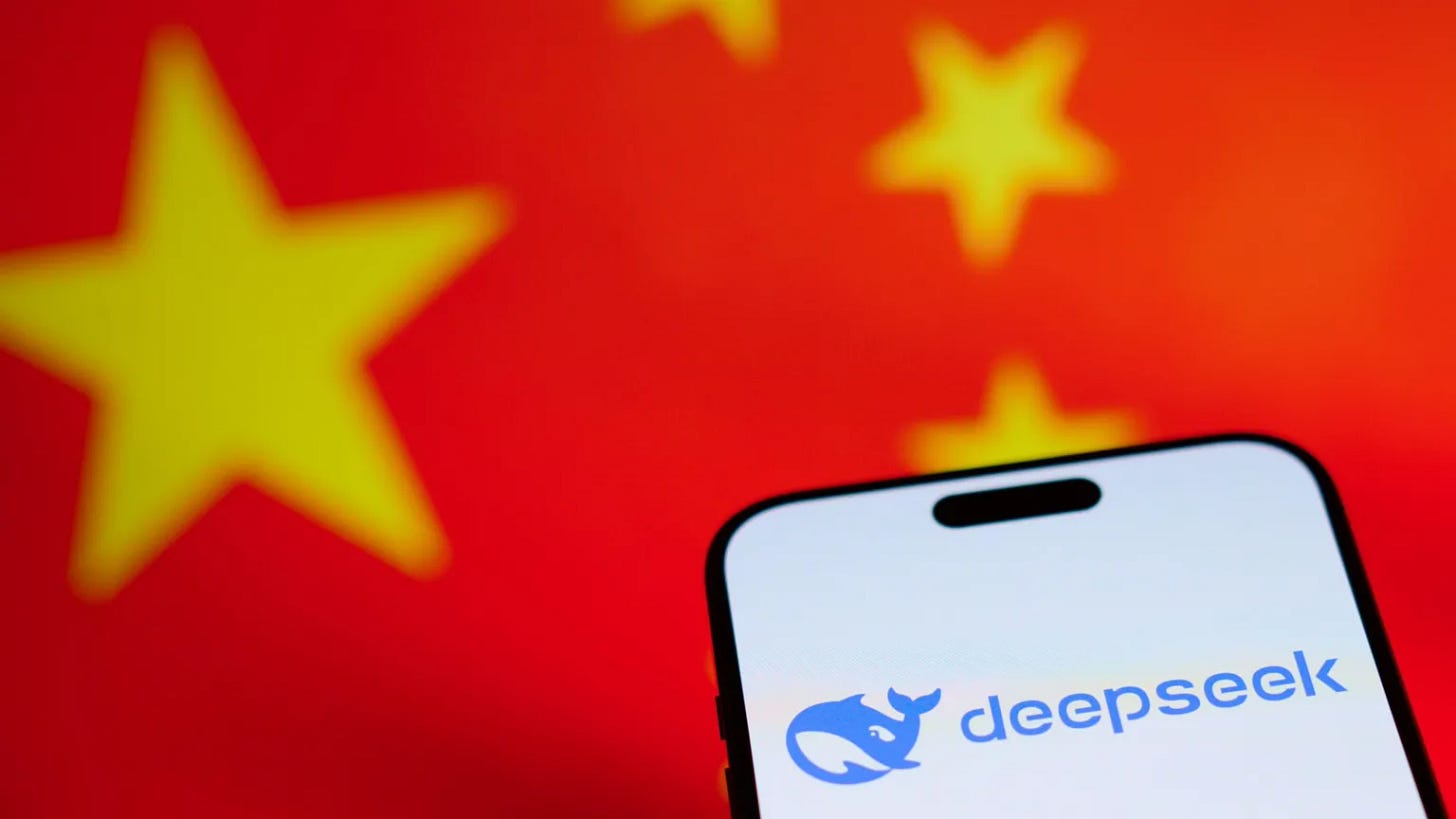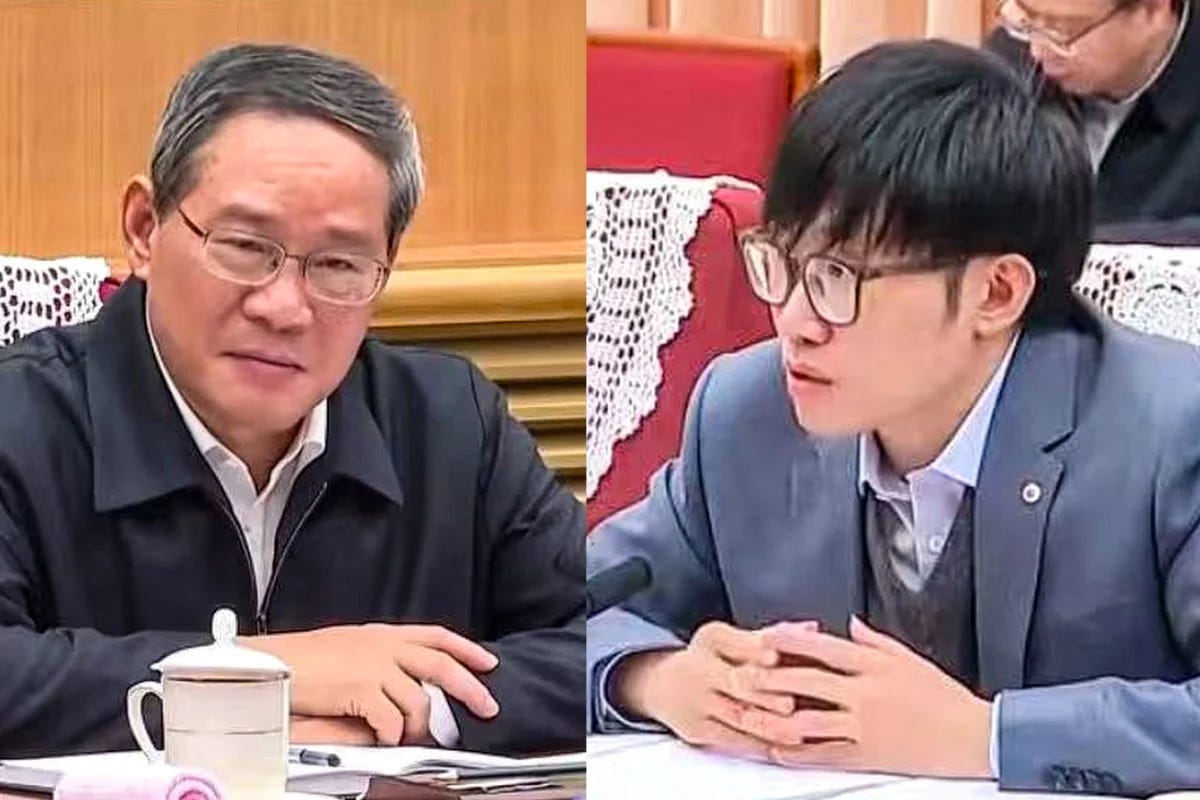DeepSeek Deep Dive: What Role Did the Chinese Government Play?
DeepSeek is a product of the Chinese security state. Here's how...
In the final week of January, a practically unknown Chinese startup did the previously unthinkable, announcing a language-learning artificial intelligence model to compete with Western models at a fraction of the cost. The timing was fortuitous, coinciding with the inaugural week of President Donald Trump's second term, the new administration's announcement of a $500 billion AI infrastructure plan, and the start of Chinese New Year festivities. It was also likely no coincidence, with evidence pointing to extensive involvement from Chinese state and military institutions. I am long past the days when I would willingly download Chinese software on my phone, but by most accounts, the thing works well, outperforming OpenAI's ChatGPT on several metrics.
I've taken extra time putting my thoughts together on this one. Having lived in China and seen its tech industry up close, I've gained valuable insights into how the sector works. I will put something together on DeepSeek's technical capabilities in the future, especially as further details arise. However, this article is about the forces that brought DeepSeek into being, specifically the Chinese government's role.
Innovation with Chinese characteristics
Nothing happens in China's tech sector without government involvement and oversight. The running narrative that some small startup division of a hedge fund independently developed DeepSeek is simply false. Party members stack the boards and management structures of every major Chinese corporation and financial institution. A 1993 law requires all companies operating in the country to allow party work units to “carry out the business of the Chinese Communist Party (CCP)” on company property. The law effectively fills the ranks of every firm with political operatives compelled to prioritize party demands over business decisions. In 2001, then-President Jiang Zemin amended the party constitution, allowing it to accept private business leaders as members. The move effectively and officially placed the country's political and economic power under one big club.
Under Xi Jinping, the club has become more authoritarian, even for its wealthiest members, as evidenced by the prolonged disappearances of billionaires such as Jack Ma, Bao Fan, and others. According to official documents, the CCP aims to “cultivate a team of private entrepreneurs who are resolute in walking with the party… and can be relied upon at a time of crisis.” For example, companies routinely organize 'study sessions' for employees to learn about Xi Jinping thought, and the party expects its more than 100 million members to partake in daily tests of their studies via a smartphone app. Xi's recent crackdown on private business was most severe on the tech and financial sectors, costing tech firms an estimated $1.1 trillion in value, targeting industry executives and bankers with criminal prosecutions, and resulting in nearly 220,000 job losses across the country.
Although regulators largely backed off in 2023, the fresh wounds inflicted by the party ensure its unprecedentedly omnipotent presence throughout China's tech industry. In this way, anyone who wishes to innovate within China's tech sector must do so in close alignment with the state and its goals. For High-Flyer Quant, the nearly $14 billion hedge fund behind DeepSeek, this compliance likely helped get the company on track following a significant downturn.
Routinely described as one of China’s most beautiful cities, Hangzhou is home to major tech firms such as Alibaba and High Flyer Quant, DeepSeek’s parent company. Image source
A tanking hedge fund embraces China's security state
In 2023, High-Flyer Quant, a relatively large hedge fund based in the picturesque tech hub of Hangzhou, Zhejiang, abruptly pivoted away from making quantitative investments using AI technology instead of focusing on developing new AI models. That year, the company unceremoniously sacked its co-founder Xu Jin, cryptically citing his "improper handling of a family matter." Given the extent of the crackdowns that had just taken place, it is possible, if not probable, that Xu was a victim of government-imposed shakeups. Perhaps Xu had some qualms about his company's dramatic pivot, or maybe he was just too involved in the trading part of the business. However, High Flyer CEO Lu Zhengzhe kept his position at the top despite significant losses in 2021–2022. In fact, the pivot increasingly took the company away from resembling a hedge fund at all.
"We have set up a new team independent of investment, which is equivalent to a second startup," Lu said in a 2023 interview with Chinese state media. Lu and his team placed Liang Wenfang, a then-37-year-old engineer, in charge of the new venture that later became known as DeepSeek. Liang had been a co-founder of High Flyer in 2015 and kept a low profile, making his first significant public appearance on January 20 to speak at a closed-door symposium organized by Premier Li Qiang, the same day DeepSeek launched its R1 model.
Under normal circumstances, the man in charge of a groundbreaking tech product would be with his team at headquarters on launch day, not 800 miles north in Beijing, with the second most powerful leader in the Chinese government. Aside from a few interviews, Liang Wenfang remains shrouded in mystery. When a reporter asked DeepSeek, "Who is Liang Wenfang?" its first answer was another Chinese entrepreneur of the same name. When further prompted, the system responded that there was no publicly available information on Liang's background and redirected the reporter to DeepSeek's official website for more information. This tight-lipped approach differs greatly from other tech firms, which routinely build cults of personality out of their leaders, driving new investment and turning casually dressed CEOs into overnight celebrities.
The actual function of High Flyer is similarly mysterious. Since pivoting toward AI development, the hedge fund has expressed a notable lack of concern with finances. "In the past thirty years, (China's tech industry) has only emphasized making money and ignored innovation. Innovation is not solely driven by business, it also needs curiosity and a desire to create," DeepSeek chief Liang said in a July 2024 interview that has since become notable. "We want to do things with greater value and things that go beyond the investment industry, but it has been misinterpreted as A.I. stock speculation," said the High Flyer CEO Lu Zhengzhe in 2023.
Misinterpreted as stock speculation? Isn't stock speculation exactly what a hedge fund is supposed to do? Just one year prior, the company apologized profusely to investors for losing more than a third of its assets under management, claiming it felt 'deeply guilty' for the record drawdown. Why such an about-face? I am speculating here, but perhaps the fund, aware of its inability to profit under current conditions in the Chinese market, instead leveraged its unique position in the AI sector to help the Chinese state achieve its AI goals.
The Chinese Internet provides few specifics about High Flyer's recent financial performance. Unlike their American counterparts, Chinese hedge funds exist within a legal and regulatory grey area; they are not required to disclose information about their investments, and most don't. The only specifics I found were a 2022 article speculating whether the company would dissolve following its abysmal performance that year and another from this year stating the company is "not short of money" – whatever that means.
Since launching DeepSeek R1, High Flyer has stated it will continue to offer DeepSeek for free to the public as the fund generates enough profit through its trading activities. Enough profit? Even if we ignore the fund's recently poor performance, are hedge fund managers and their investors ever supposed to be satisfied when it comes to money? Don't hedge funds only exist to make money for investors? Moreover, why would a hedge fund, which typically only trades in established assets and initial public offerings (IPOs), invest in a startup venture in the first place? In practically all other instances, startup investments are the realm of venture capital, not hedge funds. Only some sort of outside influence seems to explain such abnormalities.
Upon digging deeper, one finds Chinese state involvement deeply embedded throughout the DeepSeek project. Since its 2022 pivot, High Flyer has become a designated member of China's national AI strategy, receiving state funding. Local authorities in Zhejiang province also gave the company preferential tax breaks in 2023, and the company received investments from the state-owned Huajin Capital, which now maintains a super-minority stake in DeepSeek despite not claiming so in its financial disclosures.
DeepSeek maintains strong ties to the Chinese military and defense industry. Its cloud provider is Inspur, a state-run technology supplier that the US Department of Defense listed as a "Chinese military company" in 2020. Security researchers have also found that some of the app's code comes from China Mobile, a state-owned telecommunications company that maintains extensive ties to the Chinese military, for which is currently under limited US sanctions. Another company, Sugon, provided the training centers High Flyer used to develop DeepSeek; in 2019, the US sanctioned Sugon for providing services to Chinese military and state security agencies. Finally, in 2024, DeepSeek released an investor advertisement highlighting industry partners with close ties to the People's Liberation Army (PLA), including FlyTek (sanctioned in 2024), TRS, and JingYeDa. All of this indicates that DeepSeek is very much a product of the Chinese state and military institutions and that these institutions have likely subsumed its parent company to some degree.
If the extensive involvement of Chinese state and military institutions doesn't scare you, here's one more thing: DeepSeek can transmit vast amounts of user data to servers controlled by the Chinese government. South Korea's top spy agency referred to DeepSeek's level of data collection as 'excessive,' expressing further concerns over censorship due to its responses to certain questions. For example, the app claimed that the Korean delicacy Kimchi originated in China when asked about it in Chinese. More insidiously, the app responded to questions related to the 1989 massacre in Tiananmen Square with "Let's talk about something else."
Accessing more American user data could allow China to improve its espionage and intelligence gathering by gaining key insights into American society, politics, and powerful individuals while promoting its own narratives. DeepSeek is a powerful tool in this regard, and as we have seen, it is very much a product of China's security state.
DeepSeek chief Liang Wenfang (right) meets with Premier Li Qiang (left) in Beijing. Image source
Hidden costs and circumventing export controls
DeepSeek claims that it trained its R1 model at a cost of just $5.6 million—a fraction of the figures US firms have spent developing their models. However, the company's white paper does not mention the development cost. In fact, DeepSeek's backers spent much more than meets the eye.
Company records show that High Flyer spent CNY 200 million (nearly $28 million) on graphics processing units (GPUs) used to train AI algorithms in 2019, positioning the company favorably in the field of AI innovation at the time. By 2021, China's investment environment tanked, making quantitative trading models focused on the Chinese market increasingly less valuable. However, by 2023, High Flyer had purchased 10,000 more GPUs at a cost of over $137 million amid its pivot toward in-house AI development. According to Semi Analysis, an independent research and analysis company focused on the semiconductor and AI industries, DeepSeek had access to some 50,000 Nvidia Hopper generation GPUs at a total cost of around $944 million. That's nearly a billion dollars worth of capital expenditure. If it was all supplied by High Flyer, they mostly spent it after losing billions of dollars in investors' money and sacking their co-founder. This figure is also far from the amount DeepSeek claims to have spent developing its latest model.
DeepSeek claims it did not develop its latest model using chips subject to US export bans, claiming it used legally sourced Nvidia H800 chips purchased before 2023 (something I'll address further in the next part). However, industry experts claim the company most likely sourced banned chips from third-party sources in countries such as Malaysia, Singapore, and the United Arab Emirates (UAE). Nvidia's revenue from Singapore has skyrocketed in recent years, with the city-state of just under six million people now accounting for a fifth of the company's total billings. This uptick in revenue from Singapore first spiked noticeably in 2023, right after the US introduced its first export controls on semiconductor chips in late 2022. Although Nvidia previously stated that much of its Singapore billings are due to the island's role as a tax haven, with many international firms merely headquartered there and shipments often destined elsewhere, CEO Jensen Huang recently met with President Trump to discuss trade restrictions, among other things. The Singaporean government also recently vowed to uphold export curbs amid an ongoing investigation by US officials.
Whether DeepSeek sourced banned chips remains a matter of debate, and Nvidia asserts that all of its buyers comply with US laws. However, if DeepSeek and its parent company did circumvent US export controls, they likely did so through local intermediaries. Although High Flyer does not have foreign-based operations, its Chinese state-owned partners with extensive military contracts, such as Inspur, Flytek, and China Mobile, maintain offices in Singapore, Malaysia, and elsewhere. These regional offices are unlikely candidates to make illegal chip purchases under current restrictions, but their foot-in-the-door approach to these markets could allow them to covertly oversee a complex network of locally-based shell corporations to make such purchases. For this reason, it is likely that investigators are now likely watching these regional offices closer than ever.
Timing is everything
By launching a product that reportedly cost a fraction of what their competitors spent, DeepSeek eviscerated more than $1 trillion in asset values practically overnight. The launch also coincided with the new Trump administration's announcement of Stargate, a proposed $500 billion AI infrastructure megaproject backed by tech giants OpenAi and Oracle and Japan's Softbank, which controls the world's largest technology investment fund. The timing was likely no coincidence.
First, it does not take a Chinese spy to see that America's AI industry has reached a bubble. In December 2024, the Motley Fool ran an article speculating that the AI bubble would burst in 2025 – major financial news pages such as Yahoo Finance and NASDAQ both ran the article. Since 2020, the Fed has issued unprecedented amounts of cash, and investors have been looking for growth sectors to store it in amid record inflation. Following decades of science fiction-based anticipation and growing news of broad-based commercial applications, why wouldn't investors flock to the emerging AI industry? The AI bubble will almost certainly burst as the railroad and dot-com bubbles have previously. With China facing a worsening economic slump and lagging behind on AI technology, what better time to poke its finger through the bubble by launching DeepSeek?
By launching DeepSeek when it did, China has sent a message and a warning to the global investment community not to ignore Chinese technologies. In 2021, SoftBank's Vision Fund began pulling back from the Chinese tech market, citing excessive state involvement. However, if DeepSeek R1's launch sought to damage and embarrass SoftBank for its role in America's largest AI project to date, it achieved the opposite, with SoftBank recently discussing plans to invest $15–25 billion in the US-based OpenAI. Similarly, although the Gulf States Saudi Arabia and the UAE have invested in Chinese technologies, Washington’s carrot approach to courting their investment in its own AI programs and curbing those to China will likely keep their massive investment funds from significantly investing in China's AI industry moving forward.
Many other factors are worth considering regarding the timing of DeepSeek's launch. Bill Ackman, the CEO of the US hedge fund Pershing Capital Management, speculated that High Flyer could have "made a fortune" by shorting Nvidia shares just before DeepSeek's launch. What we know for sure is that DeepSeek has people talking about China's rise, and that, combined with shaken confidence in America's AI sector, is a win-win for the Chinese security state.
Conclusion
There is so much more to explore on this subject, but what we know for certain is that DeepSeek is a product of the Chinese security state. The timing of its launch undermined confidence in America's AI industry and allowed China to gain access to more American user data. Given the Chinese security state's extensive role in developing DeepSeek, this was likely no coincidence.






Investment bubbles don't mean the end of an industry. Dot-com bubble burst didn't kill the internet, obviously. Investment bubbles are just part of the growth cycle of an industry. Also, AI is going to require constant innovation. Your article suggests that innovation isn't as important in Chinese companies as it is in American companies. That's 100% true. You could almost say that innovation is what give American tech companies value. Therefore, it's likely that DeepSeek will be a short lived thing. In addition, without easy/legal access to GPUs, continued growth and innovation will be impossible.